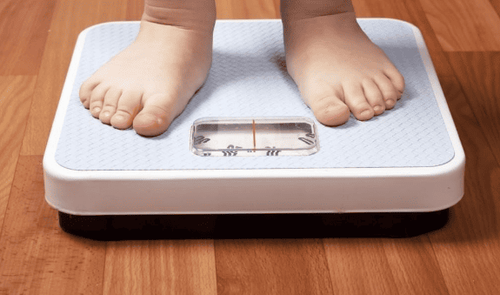This is an automatically translated article.
The article was professionally consulted by Specialist Doctor II Cao Thi Thanh - Pediatrician - Department of Pediatrics - Neonatology - Vinmec Hai Phong International General Hospital. Dr. Thanh has worked for 25 years in the treatment of neonatal pediatric diseases.Neonatal weight monitoring plays an important role in assessing a child's health. However, children do not always gain weight well. Children may gain weight slowly, gain weight quickly, or even not gain weight at all. What does the child's weight say?
1. Why is infant weight gain a concern?
Tracking your baby's growth in height and weight helps your doctor assess your baby's general health.When a baby is not gaining weight to the normal range, the baby may be diagnosed with a condition called underweight (or failure to thrive). This usually happens if a child is not eating well, or is not absorbing or providing nutrients properly. It can be caused by an eating problem, a gastrointestinal problem, or even a number of other medical conditions.
Health care providers will closely monitor a child's weight gain to assess nutritional status as it is very important for a child's physical and mental development.
When the baby is born, the doctor or nurse will weigh the baby at birth and 24 hours after birth. Your baby will continue to be weighed every time you take him or her to the doctor for the first few years of life. These measurements will be recorded on your baby's growth chart.
If your baby has any health problems, including unexpected weight loss or pathological jaundice, you may need to see your doctor more often over the next few weeks.

Trẻ không tăng cân
2. What is normal weight loss in babies in the first days after birth?
Most healthy, full-term babies will lose between 5%-10% of their birth weight in the first days. This weight loss is normal and not a cause for concern unless the baby has lost more than 10% of their birth weight.3. Normal infant weight gain in the first weeks after birth
Babies usually start to gain weight back five to seven days after birth, and most recover (or exceed) their birth weight by 2 weeks of age. Although most babies follow this trend, about 10 percent of healthy newborns will regain their postpartum weight more slowly in a few weeks.Many factors influence a baby's weight gain in the first weeks of life, including how quickly breast milk comes in and how much he wants to eat. For example, you may notice your baby wants to feed more often or for longer when he is 7 to 10 days old.
4. How will the mother know if the infant is not gaining enough weight?

Theo dõi lượng phân của trẻ có thể biết trẻ sơ sinh không tăng cân đủ
Measure urine output: For the first five days, babies may only wet a few diapers a day. After that, the number is gradually increased to four to eight wet diapers daily. Watch your baby's poop: For the first few days, some babies may poop only once a day. Then your baby will poop at least twice a day. After the first week, your baby will probably poop 10 or more times a day for the rest of the first month. In addition, parents can refer to how to choose infant formula, in case the mother is sick, lacks or does not have milk, forced to choose formula.
5. What can I do if my baby loses too much weight after birth or doesn't gain enough?
You should check with your doctor if you notice that your baby is not feeding well or has wet very little diapers. If you are concerned about your baby's weight in the first weeks after birth, talk to your doctor about the following:Weigh your baby more often Ways to feed your baby Circumstances where you should take your baby to the doctor. To check the infant does not gain weight, parents should supplement the child with supportive products containing lysine, essential micro-minerals and vitamins such as zinc, chromium, selenium, and B vitamins to help fully meet the needs. nutritional needs in children. At the same time, these essential vitamins also support digestion, enhance nutrient absorption, help improve anorexia, help children eat well, and develop comprehensively.
Please regularly visit Vinmec.com website and update useful information to take care of your baby and family.
Reference source: babycenter.com














